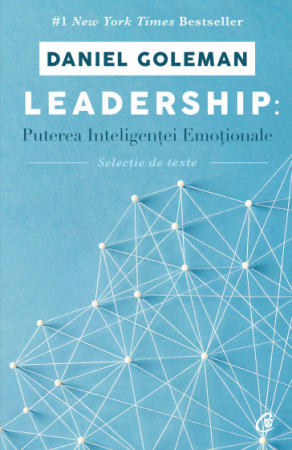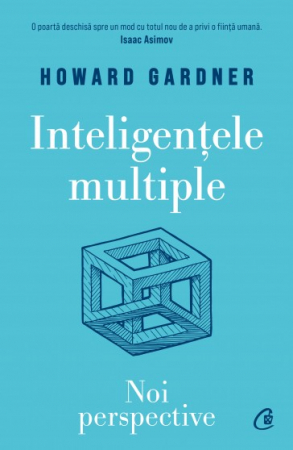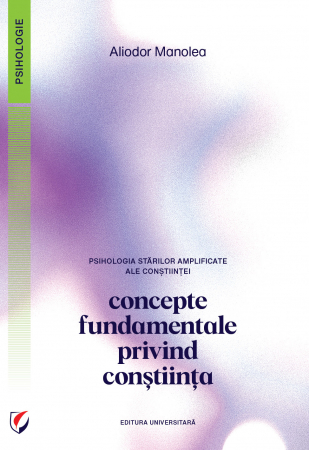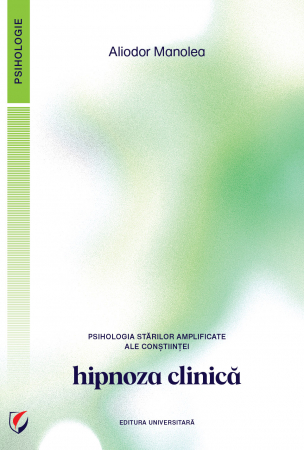Manuscript proposals: [email protected] / 0745 204 115 //// Tracking orders Individuals / Sales: 0745 200 357 / Orders Legal entities: 0721 722 783
Publisher: Editura Universitară
Author: Anghel Ilie Gradinaru
Edition: I
Pages: 258
Publisher year: 2023
ISBN: 978-606-28-1046-7
DOI: https://doi.org/10.5682/9786062810467
Product Code:
9786062810467
Do you need help?
0745 200 357
- Description
- Download (1)
- Authors
- Content
- More details
- Reviews (0)
The book Psychology of sport unifies not only the experience of a psychologist interested in the field but also of an athlete (rugby player, rugby instructor), parent of a performance athlete (swimmer) and has as its message (explicit and implicit) the idea that a talented and dedicated athlete reaches to the performance through talent and good management by a few specialists (for example, coach, trainer) of his evolutionary resources, but great performance is achieved only through the joint efforts of them with those of: the athlete's family, teaching staff, colleagues (in in the case of student or student athletes), the entourage, the sports doctor, the nutritionist, the physiotherapist, the physiotherapist, the masseur, the manufacturers of sports equipment and apparatus, other specialists according to the evolution/development of sports science, related fields and, of course, a sports psychologist.
In order to enter the gallery of elites and achieve high performance, the athlete needs, in addition to physical and technical training, psychological training in all areas of his mental functioning (from the cognitive to the motivational-affective) training that can be ensured through information / psychoeducation regarding the mental functioning of all specialists who manage their performance potential.
Based on this opinion, the book Psychology of sport s designed as a synthesis/systematization of essential information regarding the main psychological aspects that define the practice of sport and is addressed not only to young psychologists in Romania (more and more attracted to the field of psychology sports but whose professionalization is still at the beginning and in the process of stabilization, including at the level of academic training) but also to the other specialists (mentioned above) engaged in the process of training athletes to reach their maximum potential in their field of professionalization and last but not least, the athletes themselves interested in understanding their own professional and existential conditions.
The aim of the book is to provide a comprehensive picture of the issue of sports psychology (from a theoretical and practical-applicative point of view) so that psychology students, sports psychologists, other specialists who work with athletes can better understand the field of sports psychology and can manage interventions with maximum efficiency.
Currently, the contributions to the development of knowledge and practice in the field of sports psychology are impressive (in volume and subject matter). A simple search in the databases of large university and public libraries indicates the appearance, in the last half century, in the Romanian language, of numerous publications under the title of "sport/sports psychology", focused on the specific psychological aspects related to sports activity. A large part of them are course materials published by the publishing houses of some faculties (public or private). These books address a wide variety of themes and problems, some being treated slightly redundantly, others sporadically and risking being neglected in their practical application.
This volume systematizes both information provided by these sources in the Romanian language as well as information provided by international specialized literature (traditional/pioneering and current - the latest appearances and contributions) and analyzes/presents each theme/construct under the following aspects:
a) current understandings of the concept in general psychology;
b) particularities (specific) of the concept in the field of sports;
c) methods and tools for evaluation/measurement of the construct used in the field of sports;
d) psychological interventions specific to sport to optimize/facilitate the development and/or valorization of the mental activity reflected by the construct/concept.
The purpose of this book, the approach scheme above, the duty to respect good practices, the current requirements and rules regarding the use of bibliographic sources, but also personal gratitude towards the special contributions of the "pioneers" in the field of sports psychology to the development of the field, imposed taking over a considerable volume of information as it was formulated by the authors (more recently or many years ago), i.e. by direct citation, with reference to the original source.
In order to enter the gallery of elites and achieve high performance, the athlete needs, in addition to physical and technical training, psychological training in all areas of his mental functioning (from the cognitive to the motivational-affective) training that can be ensured through information / psychoeducation regarding the mental functioning of all specialists who manage their performance potential.
Based on this opinion, the book Psychology of sport s designed as a synthesis/systematization of essential information regarding the main psychological aspects that define the practice of sport and is addressed not only to young psychologists in Romania (more and more attracted to the field of psychology sports but whose professionalization is still at the beginning and in the process of stabilization, including at the level of academic training) but also to the other specialists (mentioned above) engaged in the process of training athletes to reach their maximum potential in their field of professionalization and last but not least, the athletes themselves interested in understanding their own professional and existential conditions.
The aim of the book is to provide a comprehensive picture of the issue of sports psychology (from a theoretical and practical-applicative point of view) so that psychology students, sports psychologists, other specialists who work with athletes can better understand the field of sports psychology and can manage interventions with maximum efficiency.
Currently, the contributions to the development of knowledge and practice in the field of sports psychology are impressive (in volume and subject matter). A simple search in the databases of large university and public libraries indicates the appearance, in the last half century, in the Romanian language, of numerous publications under the title of "sport/sports psychology", focused on the specific psychological aspects related to sports activity. A large part of them are course materials published by the publishing houses of some faculties (public or private). These books address a wide variety of themes and problems, some being treated slightly redundantly, others sporadically and risking being neglected in their practical application.
This volume systematizes both information provided by these sources in the Romanian language as well as information provided by international specialized literature (traditional/pioneering and current - the latest appearances and contributions) and analyzes/presents each theme/construct under the following aspects:
a) current understandings of the concept in general psychology;
b) particularities (specific) of the concept in the field of sports;
c) methods and tools for evaluation/measurement of the construct used in the field of sports;
d) psychological interventions specific to sport to optimize/facilitate the development and/or valorization of the mental activity reflected by the construct/concept.
The purpose of this book, the approach scheme above, the duty to respect good practices, the current requirements and rules regarding the use of bibliographic sources, but also personal gratitude towards the special contributions of the "pioneers" in the field of sports psychology to the development of the field, imposed taking over a considerable volume of information as it was formulated by the authors (more recently or many years ago), i.e. by direct citation, with reference to the original source.
-
Psychology of sport
Download
ANGHEL ILIE GRADINARU
Foreword / 9
Preface / 13
Introduction / 17
Chapter 1
Sport psychology - academic and applied discipline in continuous expansion / 23
1.1. Sports psychology - umbrella term for the applications of psychology in sports / 23
1.1.1. History of sport psychology / 23
1.1.2. Diversity and heterogeneity in sport psychology / 24
1.2. Sports psychology - applied branch of general psychology / 29
1.3. The status of the academic discipline of sport psychology / 37
1.4. Applied psychology in sports / 38
1.5. Applied psychology in sport and performance psychology / 41
Chapter 2
Sports psychology as a profession / 43
2.1. The challenges of sport psychology as a profession / 43
2.2. Specialization in the field of sports psychology / 46
2.3. The psychologist in the field of sports / 50
2.3.1. Training of sports psychologists / 50
2.3.2. Qualification, accreditation and certification/licensing in sports psychology / 55
2.3.3. Competences of psychologists working in the field of sports / 60
Chapter 3
Skills, abilities and competences in sports activity / 64
3.1. Skills, abilities and competences in sports activity - conceptual clarifications / 64
3.1.1. Motor skills / 64
3.1.2. Motor ability / 66
3.1.3. Motor qualities / 69
3.1.4. Competence in sports / 72
3.2. Training and perfecting skills and abilities in sports / 79
3.2.1. Perspectives of approaching the training of sports skills and abilities / 79
3.2.2. Stages of training sports skills and abilities / 83
3.2.3. Training of sports skills and abilities - methods and facilitation techniques / 85
Chapter 4
Personality and sports behavior / 89
4.1. The athlete's personality - structure and dimensions / 90
4.1.1. Temperament / 90
4.1.2. Skills / 94
4.1.3. Character / 97
4.1.4. Intelligence / 99
4.1.5. Creativity / 103
4.2. Factors and personality traits in sports activity / 104
Chapter 5
The involvement of the self in the sports activity / 112
5.1. Aspects of self involvement in sports activity / 112
5.1.1. Self and self-concept / 112
5.1.2. Self-image and self-esteem / 119
5.1.3. Self-efficacy and self-confidence / 123
5.1.4. Self-confidence and trust in the field of sports / 127
5.2. Identity of athletes / 130
5.3. Evaluation methods and interventions for optimizing the functionality of the self in sports activity / 133
Chapter 6
Motivation for sports activity / 135
6.1. Motivation for sports activity - definition and structure / 135
6.2. Perspectives for approaching motivation - applications in sports activity / 138
6.3. Forms of motivation - individual differences in the motivation of athletes / 144
6.3.1. Intrinsic motivation in sports activity/sport practice / 144
6.3.2. Extrinsic motivation in sports activity/sport practice / 146
6.3.3. Motivation for achievement/success / 147
6.4. Sports performance and motivation: optimal motivation and dysfunctions of motivation / 149
6.5. Ways of measuring and facilitating/optimizing motivation in sports / 152
Chapter 7
Aggressiveness, aggression and violence in sport / 156
7.1. Aggressiveness and aggression in sport - conceptual boundaries and particularities / 157
7.2. Aggression and violence in sport - conceptual boundaries and particularities / 159
7.3. Forms of aggression, aggression and violence - particularities in sports activity / 161
7.4. Explanatory theories and models of aggression and aggression in sports / 165
7.5. Measuring tools and methods of intervention to reduce aggression and violence in sports / 168
Chapter 8
Anxiety in sports activity / 174
8.1. Definition of anxiety / 174
8.2. Approach perspectives and theories of anxiety in sports activity / 176
8.3. Forms of anxiety - particularities in sports activity / 178
8.4. Anxiety and performance in sports: jumping under pressure / 180
8.5. Dimensions/components of anxiety in sports activity / 182
8.6. Anxiety factors - particularities in sports activity / 184
8.7. Assessment and intervention methods for reducing anxiety in athletes / 186
8.7.1. Methods for assessing anxiety in athletes / 186
8.7.2. Interventions to reduce anxiety in athletes / 188
Chapter 9
Social factors of sports performance / 192
9.1. Group and team concepts / 192
9.1.1. Group and team in sport - conceptual boundaries / 192
9.1.2. Formation, development and maturation of sports groups and teams / 194
9.1.3. Cohesion of sports groups and teams / 196
9.1.4. Social influence in sports groups / 199
9.2. Leadership in sports. / 201
9.2.1. The concept of leadership / 201
9.2.2. Leadership style / 203
9.3. Evaluation and intervention in sports groups and teams / 207
Chapter 10
Psychological services in the field of sports / 212
10.1. Psychological services in the field of sports - unity and diversity / 212
10.2. Types of services delivered by the sports psychologist / 216
10.2.1. Psychological evaluation / 217
10.2.2. Training, education and training / 217
10.2.3. Counseling / 218
10.2.4. Consulting / 218
10.2.5. Mentoring / 219
10.2.6. Coaching / 221
10.2.7. Psychological services addressed to specialists dealing with athletes / 221
10.3. Specific aspects of the delivery of psychological services in sports. / 222
Chapter 11
Psychological interventions in the field of sports - strategies, methods and techniques / / 226
11.1. Specific aspects of psychological interventions in the sports environment / 226
11.2. Strategies, methods and techniques used in the delivery of psychological services in the field of sports / 230
11.2.1. Imagery/ Mental imagery (mental imagery) / 232
11.2.2. Self talk / 234
11.3. Somatic methods / 234
11.3.1. Biofeedback / 235
11.3.2. Progressive muscle relaxation / 235
11.3.3. Meditation / 236
Bibliography / 238
Preface / 13
Introduction / 17
Chapter 1
Sport psychology - academic and applied discipline in continuous expansion / 23
1.1. Sports psychology - umbrella term for the applications of psychology in sports / 23
1.1.1. History of sport psychology / 23
1.1.2. Diversity and heterogeneity in sport psychology / 24
1.2. Sports psychology - applied branch of general psychology / 29
1.3. The status of the academic discipline of sport psychology / 37
1.4. Applied psychology in sports / 38
1.5. Applied psychology in sport and performance psychology / 41
Chapter 2
Sports psychology as a profession / 43
2.1. The challenges of sport psychology as a profession / 43
2.2. Specialization in the field of sports psychology / 46
2.3. The psychologist in the field of sports / 50
2.3.1. Training of sports psychologists / 50
2.3.2. Qualification, accreditation and certification/licensing in sports psychology / 55
2.3.3. Competences of psychologists working in the field of sports / 60
Chapter 3
Skills, abilities and competences in sports activity / 64
3.1. Skills, abilities and competences in sports activity - conceptual clarifications / 64
3.1.1. Motor skills / 64
3.1.2. Motor ability / 66
3.1.3. Motor qualities / 69
3.1.4. Competence in sports / 72
3.2. Training and perfecting skills and abilities in sports / 79
3.2.1. Perspectives of approaching the training of sports skills and abilities / 79
3.2.2. Stages of training sports skills and abilities / 83
3.2.3. Training of sports skills and abilities - methods and facilitation techniques / 85
Chapter 4
Personality and sports behavior / 89
4.1. The athlete's personality - structure and dimensions / 90
4.1.1. Temperament / 90
4.1.2. Skills / 94
4.1.3. Character / 97
4.1.4. Intelligence / 99
4.1.5. Creativity / 103
4.2. Factors and personality traits in sports activity / 104
Chapter 5
The involvement of the self in the sports activity / 112
5.1. Aspects of self involvement in sports activity / 112
5.1.1. Self and self-concept / 112
5.1.2. Self-image and self-esteem / 119
5.1.3. Self-efficacy and self-confidence / 123
5.1.4. Self-confidence and trust in the field of sports / 127
5.2. Identity of athletes / 130
5.3. Evaluation methods and interventions for optimizing the functionality of the self in sports activity / 133
Chapter 6
Motivation for sports activity / 135
6.1. Motivation for sports activity - definition and structure / 135
6.2. Perspectives for approaching motivation - applications in sports activity / 138
6.3. Forms of motivation - individual differences in the motivation of athletes / 144
6.3.1. Intrinsic motivation in sports activity/sport practice / 144
6.3.2. Extrinsic motivation in sports activity/sport practice / 146
6.3.3. Motivation for achievement/success / 147
6.4. Sports performance and motivation: optimal motivation and dysfunctions of motivation / 149
6.5. Ways of measuring and facilitating/optimizing motivation in sports / 152
Chapter 7
Aggressiveness, aggression and violence in sport / 156
7.1. Aggressiveness and aggression in sport - conceptual boundaries and particularities / 157
7.2. Aggression and violence in sport - conceptual boundaries and particularities / 159
7.3. Forms of aggression, aggression and violence - particularities in sports activity / 161
7.4. Explanatory theories and models of aggression and aggression in sports / 165
7.5. Measuring tools and methods of intervention to reduce aggression and violence in sports / 168
Chapter 8
Anxiety in sports activity / 174
8.1. Definition of anxiety / 174
8.2. Approach perspectives and theories of anxiety in sports activity / 176
8.3. Forms of anxiety - particularities in sports activity / 178
8.4. Anxiety and performance in sports: jumping under pressure / 180
8.5. Dimensions/components of anxiety in sports activity / 182
8.6. Anxiety factors - particularities in sports activity / 184
8.7. Assessment and intervention methods for reducing anxiety in athletes / 186
8.7.1. Methods for assessing anxiety in athletes / 186
8.7.2. Interventions to reduce anxiety in athletes / 188
Chapter 9
Social factors of sports performance / 192
9.1. Group and team concepts / 192
9.1.1. Group and team in sport - conceptual boundaries / 192
9.1.2. Formation, development and maturation of sports groups and teams / 194
9.1.3. Cohesion of sports groups and teams / 196
9.1.4. Social influence in sports groups / 199
9.2. Leadership in sports. / 201
9.2.1. The concept of leadership / 201
9.2.2. Leadership style / 203
9.3. Evaluation and intervention in sports groups and teams / 207
Chapter 10
Psychological services in the field of sports / 212
10.1. Psychological services in the field of sports - unity and diversity / 212
10.2. Types of services delivered by the sports psychologist / 216
10.2.1. Psychological evaluation / 217
10.2.2. Training, education and training / 217
10.2.3. Counseling / 218
10.2.4. Consulting / 218
10.2.5. Mentoring / 219
10.2.6. Coaching / 221
10.2.7. Psychological services addressed to specialists dealing with athletes / 221
10.3. Specific aspects of the delivery of psychological services in sports. / 222
Chapter 11
Psychological interventions in the field of sports - strategies, methods and techniques / / 226
11.1. Specific aspects of psychological interventions in the sports environment / 226
11.2. Strategies, methods and techniques used in the delivery of psychological services in the field of sports / 230
11.2.1. Imagery/ Mental imagery (mental imagery) / 232
11.2.2. Self talk / 234
11.3. Somatic methods / 234
11.3.1. Biofeedback / 235
11.3.2. Progressive muscle relaxation / 235
11.3.3. Meditation / 236
Bibliography / 238
The book Psychology of sport unifies not only the experience of a psychologist interested in the field but also of an athlete (rugby player, rugby instructor), parent of a performance athlete (swimmer) and has as its message (explicit and implicit) the idea that a talented and dedicated athlete reaches to the performance through talent and good management by a few specialists (for example, coach, trainer) of his evolutionary resources, but great performance is achieved only through the joint efforts of them with those of: the athlete's family, teaching staff, colleagues (in in the case of student or student athletes), the entourage, the sports doctor, the nutritionist, the physiotherapist, the physiotherapist, the masseur, the manufacturers of sports equipment and apparatus, other specialists according to the evolution/development of sports science, related fields and, of course, a sports psychologist.
In order to enter the gallery of elites and achieve high performance, the athlete needs, in addition to physical and technical training, psychological training in all areas of his mental functioning (from the cognitive to the motivational-affective) training that can be ensured through information / psychoeducation regarding the mental functioning of all specialists who manage their performance potential.
Based on this opinion, the book Psychology of sport s designed as a synthesis/systematization of essential information regarding the main psychological aspects that define the practice of sport and is addressed not only to young psychologists in Romania (more and more attracted to the field of psychology sports but whose professionalization is still at the beginning and in the process of stabilization, including at the level of academic training) but also to the other specialists (mentioned above) engaged in the process of training athletes to reach their maximum potential in their field of professionalization and last but not least, the athletes themselves interested in understanding their own professional and existential conditions.
The aim of the book is to provide a comprehensive picture of the issue of sports psychology (from a theoretical and practical-applicative point of view) so that psychology students, sports psychologists, other specialists who work with athletes can better understand the field of sports psychology and can manage interventions with maximum efficiency.
Currently, the contributions to the development of knowledge and practice in the field of sports psychology are impressive (in volume and subject matter). A simple search in the databases of large university and public libraries indicates the appearance, in the last half century, in the Romanian language, of numerous publications under the title of "sport/sports psychology", focused on the specific psychological aspects related to sports activity. A large part of them are course materials published by the publishing houses of some faculties (public or private). These books address a wide variety of themes and problems, some being treated slightly redundantly, others sporadically and risking being neglected in their practical application.
This volume systematizes both information provided by these sources in the Romanian language as well as information provided by international specialized literature (traditional/pioneering and current - the latest appearances and contributions) and analyzes/presents each theme/construct under the following aspects:
a) current understandings of the concept in general psychology;
b) particularities (specific) of the concept in the field of sports;
c) methods and tools for evaluation/measurement of the construct used in the field of sports;
d) psychological interventions specific to sport to optimize/facilitate the development and/or valorization of the mental activity reflected by the construct/concept.
The purpose of this book, the approach scheme above, the duty to respect good practices, the current requirements and rules regarding the use of bibliographic sources, but also personal gratitude towards the special contributions of the "pioneers" in the field of sports psychology to the development of the field, imposed taking over a considerable volume of information as it was formulated by the authors (more recently or many years ago), i.e. by direct citation, with reference to the original source.
The more time passes, the more the opinions and recommendations of specialists (psychologists, coaches, exegetes, etc.) risk either becoming commonplace, part of common, popular knowledge, or fading into the professional consciousness of current practitioners, which is unfair to by the promoters of these opinions and recommendations and unproductive for the specialists who take them over.
The author expresses his hope that the approach presented by this volume will contribute to the development of scientific thinking in sports psychology, which will lead to an increase in the quality of psychological services in the field of sports and, implicitly, to an increase in the chances of athletes to evolve, according to their real potential, from performance at high performance.
Author
In order to enter the gallery of elites and achieve high performance, the athlete needs, in addition to physical and technical training, psychological training in all areas of his mental functioning (from the cognitive to the motivational-affective) training that can be ensured through information / psychoeducation regarding the mental functioning of all specialists who manage their performance potential.
Based on this opinion, the book Psychology of sport s designed as a synthesis/systematization of essential information regarding the main psychological aspects that define the practice of sport and is addressed not only to young psychologists in Romania (more and more attracted to the field of psychology sports but whose professionalization is still at the beginning and in the process of stabilization, including at the level of academic training) but also to the other specialists (mentioned above) engaged in the process of training athletes to reach their maximum potential in their field of professionalization and last but not least, the athletes themselves interested in understanding their own professional and existential conditions.
The aim of the book is to provide a comprehensive picture of the issue of sports psychology (from a theoretical and practical-applicative point of view) so that psychology students, sports psychologists, other specialists who work with athletes can better understand the field of sports psychology and can manage interventions with maximum efficiency.
Currently, the contributions to the development of knowledge and practice in the field of sports psychology are impressive (in volume and subject matter). A simple search in the databases of large university and public libraries indicates the appearance, in the last half century, in the Romanian language, of numerous publications under the title of "sport/sports psychology", focused on the specific psychological aspects related to sports activity. A large part of them are course materials published by the publishing houses of some faculties (public or private). These books address a wide variety of themes and problems, some being treated slightly redundantly, others sporadically and risking being neglected in their practical application.
This volume systematizes both information provided by these sources in the Romanian language as well as information provided by international specialized literature (traditional/pioneering and current - the latest appearances and contributions) and analyzes/presents each theme/construct under the following aspects:
a) current understandings of the concept in general psychology;
b) particularities (specific) of the concept in the field of sports;
c) methods and tools for evaluation/measurement of the construct used in the field of sports;
d) psychological interventions specific to sport to optimize/facilitate the development and/or valorization of the mental activity reflected by the construct/concept.
The purpose of this book, the approach scheme above, the duty to respect good practices, the current requirements and rules regarding the use of bibliographic sources, but also personal gratitude towards the special contributions of the "pioneers" in the field of sports psychology to the development of the field, imposed taking over a considerable volume of information as it was formulated by the authors (more recently or many years ago), i.e. by direct citation, with reference to the original source.
The more time passes, the more the opinions and recommendations of specialists (psychologists, coaches, exegetes, etc.) risk either becoming commonplace, part of common, popular knowledge, or fading into the professional consciousness of current practitioners, which is unfair to by the promoters of these opinions and recommendations and unproductive for the specialists who take them over.
The author expresses his hope that the approach presented by this volume will contribute to the development of scientific thinking in sports psychology, which will lead to an increase in the quality of psychological services in the field of sports and, implicitly, to an increase in the chances of athletes to evolve, according to their real potential, from performance at high performance.
Author
If you want to express your opinion about this product you can add a review.
write a review

6359.png)
![Psychology of sport [1] Psychology of sport [1]](https://gomagcdn.ro/domains/editurauniversitara.ro/files/product/large/psihologia-sportului-913120.jpg)














